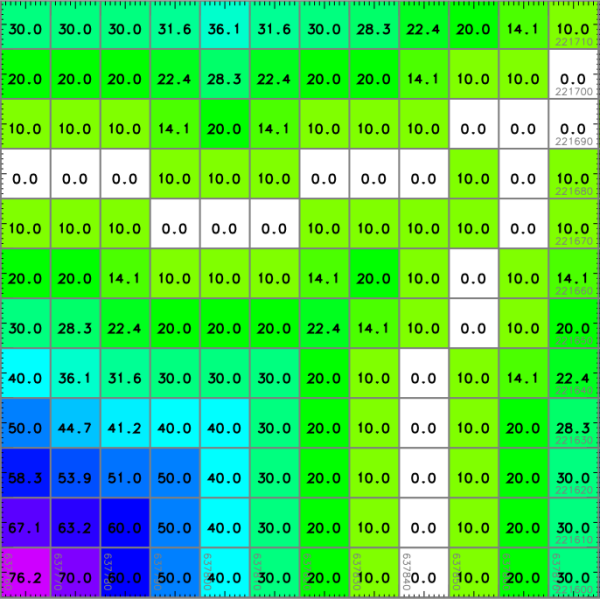Note: This document is for an older version of GRASS GIS that has been discontinued. You should upgrade, and read the current manual page.

NAME
d.rast.num - Overlays cell category values on a raster map displayed in the active graphics frame.KEYWORDS
display, map annotations, rasterSYNOPSIS
Flags:
- -a
- Align grids with raster cells
- -f
- Get text color from cell color value
- --help
- Print usage summary
- --verbose
- Verbose module output
- --quiet
- Quiet module output
- --ui
- Force launching GUI dialog
Parameters:
- map=name [required]
- Name of raster map
- text_color=name
- Text color
- Either a standard color name or R:G:B triplet
- Default: black
- grid_color=name
- Grid color
- Either a standard color name, R:G:B triplet, or "none"
- Default: gray
- precision=integer
- Number of significant digits (floating point only)
- Options: 0, 1, 2, 3, 4, 5, 6, 7, 8, 9
- Default: 1
- font=string
- Font name
- path=name
- Path to font file
- charset=string
- Text encoding (only applicable to TrueType fonts)
Table of contents
DESCRIPTION
d.rast.num overlays cell category values onto a raster map layer displayed on the user's graphics monitor. Category values will be displayed in the text color given and scaled to fit within a single cell. A grid outlining each map cell will also be overlain in a user-specified color, unless it has been set to "none".If no grid color is given the default will be used. If no map layer is specified, the program will use whatever raster map layer is currently displayed in the active frame on the graphics monitor.
If the -f flag is given the displayed number will take on the color of the base map in that cell.
NOTES
The user is advised to set the current region to a relatively small area (i.e., less than 100 rows by 100 columns); otherwise, the individual cells being displayed will be small and the category value associated with each will be difficult to see. No data cells are indicated with "Null".EXAMPLE
A) Distance from the streams network (North Carolina sample dataset):g.region raster=streams_derived -p r.grow.distance input=streams_derived distance=dist_from_streams d.rast.num dist_from_streams -a

Euclidean distance from the streams network in meters (detail, numbers shown with d.rast.num)
SEE ALSO
d.frame, d.grid, d.rast, d.rast.arrow, d.rast.edit, g.region, r.slope.aspectAUTHORS
Raghavan Srinivasan, and Chris Rewerts,Agricultural Engineering, Purdue University
SOURCE CODE
Available at: d.rast.num source code (history)
Latest change: Monday Nov 18 20:15:32 2019 in commit: 1a1d107e4f6e1b846f9841c2c6fabf015c5f720d
Main index | Display index | Topics index | Keywords index | Graphical index | Full index
© 2003-2023 GRASS Development Team, GRASS GIS 7.8.9dev Reference Manual